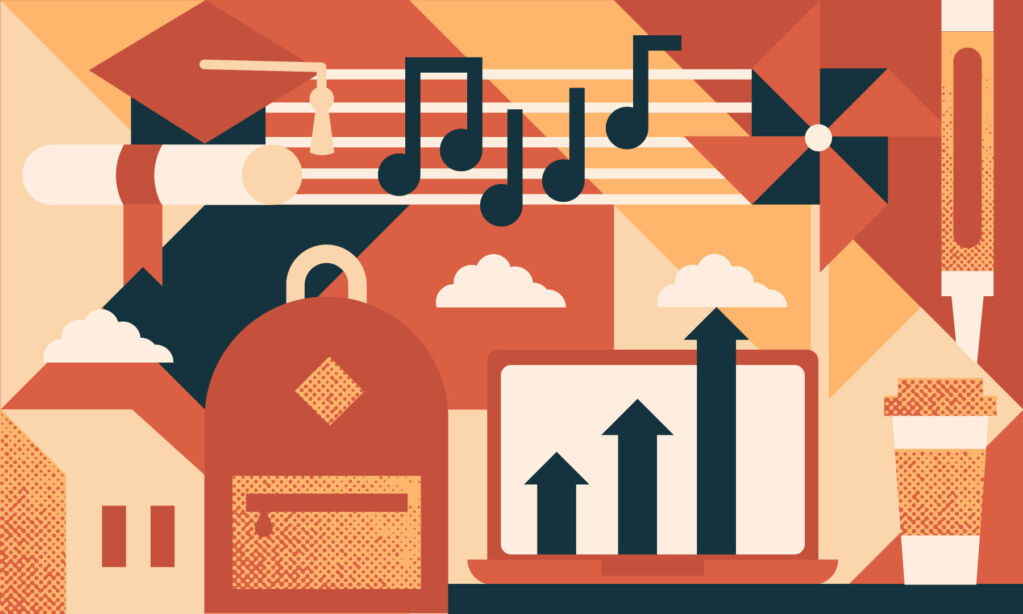How has the COVID-19 crisis affected teachers, families, and ongoing threats to public education? This special issue of Our Schools/Our Selves emerged from our research with secondary teachers in Ontario and Alberta who expressed frustration with education policies that failed to meet the needs of students in their care during the pandemic. They described1 challenges of interpreting and translating contradictory policy directives; impacts on students and educational equity; and the wearing effects on their mental health and well-being, which were consistent with findings reported from the Canadian Teachers’ Federation.2
Rather than taking a binary approach to enacting policy directives—by implementing them uncritically or by simply ignoring them—teachers consider a multitude of variables as they decide3 how policies will be enacted in their classrooms. Educators’ choices are shaped by their local context, which include professional culture, values and attitudes, physical and digital infrastructure, staffing and budget, as well as the broader social, economic, and political context within which schools are situated.
Disruption to education during the COVID-19 pandemic was certainly not limited to secondary teachers nor to just two provinces. It was a global experience that differentially impacted students4 and posed acute challenges to teachers, early childhood educators, occasional teachers, educational support and professional support personnel—all of whom are an integral part of maintaining continuity and connection in schools.
Frontline workers, including teachers, are leaders in this pandemic. They are compelled to exercise agency and creativity when confronted by gaps in policy even as it impacts their workload and mental health. Our study’s findings show that teachers in adult education, education in congregate settings (e.g., in group homes), rural, remote, and northern communities, and Intensive Support Programs serving students with autism, and students with physical, developmental, and learning disabilities, struggled to interpret and enact government policies that did not take their students’ needs or learning environments into account.
While frontline leadership during a crisis in the absence of support may be necessary, it is also, ultimately, unsustainable and not a solution to broader struggles for investment in social support for those vulnerable to systemic inequity.
From Saskatchewan, Ontario, and Nova Scotia, to New Brunswick, Manitoba, and Alberta, commentaries and articles in this issue centre the voices of education workers and their experiences during this pandemic. They also communicate research that highlights the impact of the pandemic on students and families, as well as parallel social crises: the underfunding of social services, divestment from public education, systemic oppression and anti-Black racism.
These insights do not call for a return to normal but instead offer a chorus of authors demanding transformation in schooling, one that centres justice for students vulnerable to harm in the education system. Public education is aspirational and, as many articles in this special issue show, reflects and often reproduces societal inequities; however, it is also a system among many public services worthy of defense.
A looming alternative is a market-based model of schooling, a foothold for which has been strengthened through EdTech opportunism and the expansion of surveillance technologies during the COVID-19 pandemic. For the first time in history, mass numbers of students were forced to learn online and, in certain jurisdictions, some continue to do so under a crisis model of online education that deprofessionalizes education workers, monetizes public education, and leaves students behind.
Market-based models of schooling also include legislation poised to expand charter schools5 in Alberta and direct household cash transfers in Ontario,6
both of which divest funding from public education. There is resistance to these efforts, and success such as the case of Manitoba where attempts to centralize and remove representation from decision making were defeated.7 As reforms continue to chip away at our public education system during and beyond this crisis, we must remain skeptical of language that centres “choice,” “efficiency,” and “modernization.”
A vision for public education has to be more ambitious than just reform inside the school. It requires a transformation of conditions under which many children grow up and must centre frontline voices in education, including education workers, students, and the families they serve. Once we recognize the interdependence of schools within communities, and between communities, we are called to resist efforts to dismantle education as a public good; to reclaim a vision for education grounded in participatory democracy, equality, and justice; and to revolutionize how education leadership is conceptualized, practiced, and sustained.
Read the Winter/Spring 2022 edition of Our School/Our Selves here.
Notes
1 Farhadi, B., & Winton, S. (2021). Building a Plane While Flying: Crisis Policy Enactment During COVID-19 in Alberta Secondary Schools. Journal of Teaching and Learning, 15(2), 117–132.
2 Canadian Teachers’ Federation. (2020). Pandemic research report: Teacher mental health check-in survey. https://vox.ctf-fce.ca/wp-cont...uploads/2020/11/Doc-13-1-Pandemic-Research-Report-Teacher-MentalHealth-Check-in-Survey.pdf
3 Ball, S. J., Maguire, M., & Braun, A. (2011). How schools do policy: Policy enactments in secondary schools. Routledge.
4 Whitley, J., Beauchamp, M. H., & Brown, C. (2021). The impact of COVID-19 on the learning and achievement of vulnerable Canadian children and youth. Facets. https://doi.org/10.1139/facets...; Allen, U., Collins, T., Dei, G.J., Henry, F., Ibrahim, A., James, C., Jean-Pierre, J., Kobayashi, A., Lewis, K., McKenzie, K. and Mawani, R. (2021). Impacts of COVID-19 in Racialized Communities. Royal Society of Canada https://dx.doi.org/10.14288/1....
5 Mindzak, M. (2020, July 7). Charter schools: What you need to know about their anticipated growth in Alberta. The Conversation. http://theconversation.com/cha...
6 Ontario Ministry of Education. (2020). Ontario Providing Additional Financial Support for Young Learners. Government of Ontario. https://news.ontario.ca/en/release/59415/ontario-providing-additional-financial-support-for-young-learners
7 Burgen, R. (2021, Sept. 1). “Embattled education bill will not move forward under new Manitoba premier.” CBC News. https://www.cbc.ca/news/canada...manitoba/kelvin-goertzen-address-premier-manitoba-1.6161195









